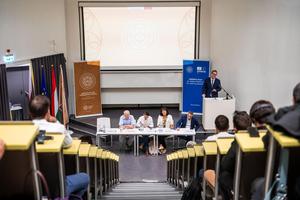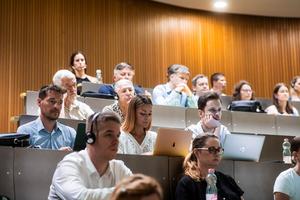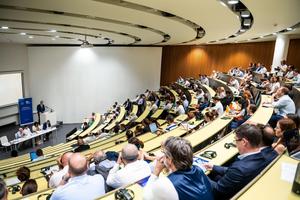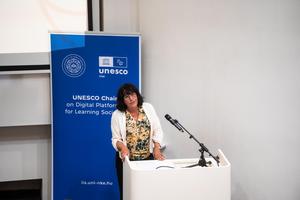The Institute of the Information Society (now as the UNESCO Chair on Digital Platforms for Learning Societies) in cooperation with the National Media and Infocommunications Authority organised an international conference on the social impact of internet platforms and their regulation on 26 June, for the fourth time this year, in the Educational Building of the Ludovika University of Public Service.
Digital platforms have transformed online communication, which has also reshaped public discourse, said András Koltay, President of the National Media and Infocommunications Authority and the Media Council, in his opening remarks. On the World Wide Web, more and more people can freely address an increasing number of users, which, in addition to opportunities, also carries risks. Although we can say almost anything online, we must comply with the relevant rules. At the same time, it is becoming increasingly difficult to identify illegal content. Platforms have not only created new challenges for authorities, but their regular use has also transformed media consumption habits. Huge content providers have emerged, often offering personalized content that is difficult to control. The latter has a serious impact on public opinion, for example on the diversity of viewpoints.
Should we go beyond the legal framework?
There may be conflicts between democracy and the interests of digital platforms, but the most important thing is to clarify what can and cannot be expected from the legal framework on platforms, said Bernát Török, director of the Institute of the Information Society, at the beginning of his presentation entitled Promoting democracy on platforms. If the right regulations help in this, platforms can not only limit but also promote democracy (since it is possible to address the masses without gatekeepers). For the time being, however, it appears that the current regulations are insufficient, and it is not certain that legal regulations alone will be sufficient. Disinformation, extreme polarization, and preserving the integrity of elections pose serious threats to platforms. These risks are amplified by the enormous reach of platforms, the loss of epistemic authority in society (who are the truly credible speakers and fact checkers?), and the spread of mass thinking (immediate and emotional reactions) instead of multifaceted public thinking. These problems, which are mainly social rather than legal in nature, are obviously difficult to address in a digital services act.
Comply in advance or correct afterwards?
There are strong contradictions between human rights thinking and consumer protection thinking as applied to platforms, emphasized Zsolt Ződi, research professor at the Institute of the Information Society, in his presentation entitled Consumer protection vs human rights protection: an ex ante – ex post dilemma on platforms. Platforms are becoming capable of more and more functions, so users are increasingly presenting their entire personalities on them. Traditional law is based on different areas of life: someone may be a consumer, a husband, a voter, a seller, or a buyer—and these are all separate roles. The EU has chosen a mixed model for regulating digital spaces, which includes consumer protection, investor protection, technology, and human rights, but these elements have merely been cobbled together, resulting in a lack of coherence. The boundaries between human rights and consumer economic protection are blurred. The essence of the “ex ante – ex post dilemma” is whether to prevent all violations of the law or to let the market operate freely and only intervene when something goes wrong. Compliance and ex ante rules are becoming increasingly common today, and most of the DSA also stipulates that damage must be prevented – just as in the area of consumer protection. However, fundamental rights can rarely be measured in this way, because they are rather principles that depend on context, than rules. This means that it will probably be even more difficult to enforce fundamental rights on platforms than elsewhere, as technology companies will undoubtedly entrust this task to AI.
Text: Tibor Sarnyai
Photo: Dénes Szilágyi










